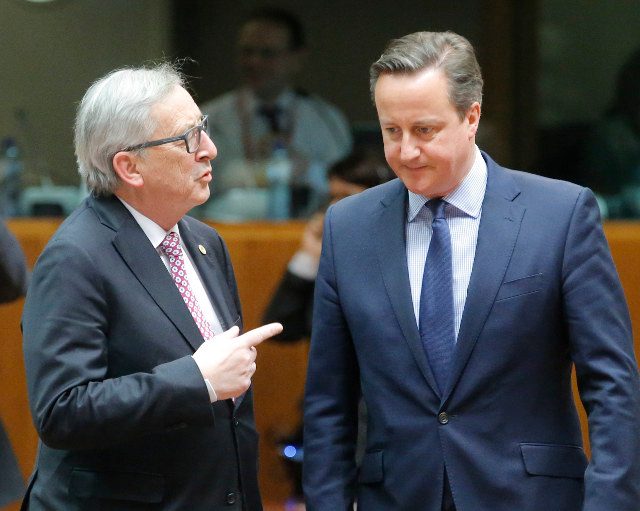SUMMARY
This is AI generated summarization, which may have errors. For context, always refer to the full article.

BRUSSELS, Belgium – British Prime Minister David Cameron threatened to walk away Thursday, February 18, from a “make or break” EU summit without a deal as his counterparts warned they would not pay any price to stop Britain crashing out of the bloc.
“I’ll be battling for Britain. If we can get a good deal I’ll take that deal but I will not take a deal that doesn’t meet what we need,” Cameron told reporters as he arrived for the meeting in Brussels.
Cameron wants a deal on reforms to the 28-nation European Union before holding a referendum as early as June but many member states are hostile to Britain getting special treatment when they have grievances of their own.
Talks were going down to the wire on Cameron’s four challenging demands – welfare restrictions to help curb immigration, safeguards for non-euro Britain, increasing EU competitiveness and an opt-out from closer EU integration.
French President Francois Hollande said agreement with Britain was “possible” and that was what he wanted — but raised fresh doubts over the protections for non eurozone countries.
“No country can have the right to veto, we cannot hold Europe back from advancing,” he said. “It is the EU that is stake, not just a country.”
Merkel working to meet demands
Cameron won crucial backing Wednesday from German Chancellor Angela Merkel who said Berlin had shared his concerns “for many years”.
Arriving for the summit, Merkel said there were still some issues to resolve but she was “happy to do everything to create the conditions for Britain to remain part of the European Union”, she said.
“This is important from a German point of view but of course this will be decided by British voters in the end.”
For her part, straight-talking Lithuanian President Dalia Grybauskaite punctured some of the summit rhetoric.
“I think everyone will have their own little drama and then we will agree,” Grybauskaite said.
European Commission chief Jean-Claude Juncker said he was “quite confident” of a deal, but former Polish premier Tusk was more cautious.
“We are in the middle of still very difficult and sensitive negotiations on the UK question. One thing is clear to me though: this is a make or break summit,” Tusk told reporters.
Cameron, under pressure from eurosceptics in his centre-right Conservative Party and a hostile right-wing press, says he will back a ‘Yes’ vote in a referendum expected this June if he can cut a deal in Brussels.
Failing that, he has said all options are open, refusing to rule out the possibility that Britain could become the first country to leave the EU in its more than 60-year history.
EU, Britain’s fault line
A leaked draft of the summit conclusions seen Thursday had a number of key passages in brackets, including on safeguards for non-euro Britain and on migrant benefits, meaning they have not been agreed despite weeks of tense negotiations.
Brussels has offered an “emergency brake” to limit benefits for new migrants for four years, which Britain could invoke if its welfare system is overwhelmed by the inflow of workers, as it believes it has been.
But Poland and other east European member states who have hundreds of thousands of citizens in Britain bitterly oppose such a change, saying it would discriminate against them and undermine the EU’s core principle of freedom of movement.
Polish Prime Minister Beata Szydlo said on her arrival: “We want a good agreement but not at any price.”
Cameron has staked his political survival on winning the referendum in the hope of ending a feud over Britain’s place in the EU that has plagued his Conservative Party for decades.
Britons voted overwhelmingly in favour of staying in the EU in a 1975 referendum, just two years after joining, when the then Labour government said the country would miss out on Europe’s growing prosperity if it left.
That is the same case made now – but with Britain more prosperous and growing faster than most of its EU peers, eurosceptics say ‘Brexit’ should hold no fears.
Recent opinion polls show British voters narrowly mixed on EU membership but there does seem to have been a modest increase in the ‘No’ camp. – Bryan McManus and Danny Kemp, AFP/Rappler.com
Add a comment
How does this make you feel?
There are no comments yet. Add your comment to start the conversation.